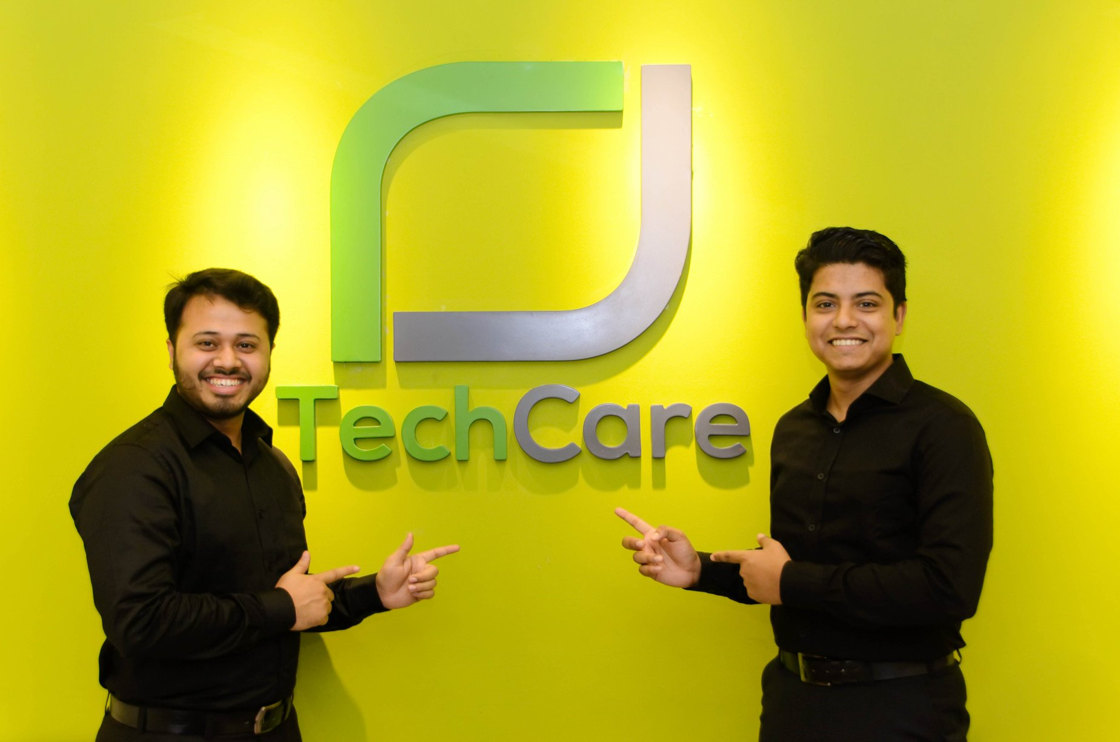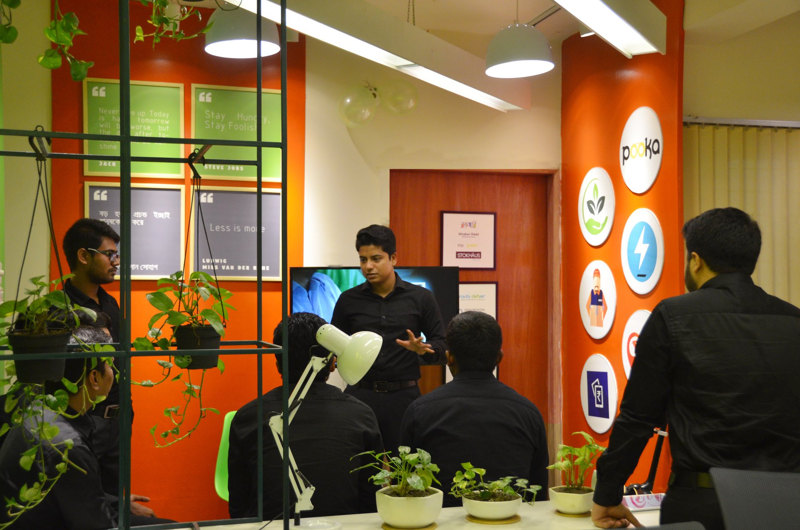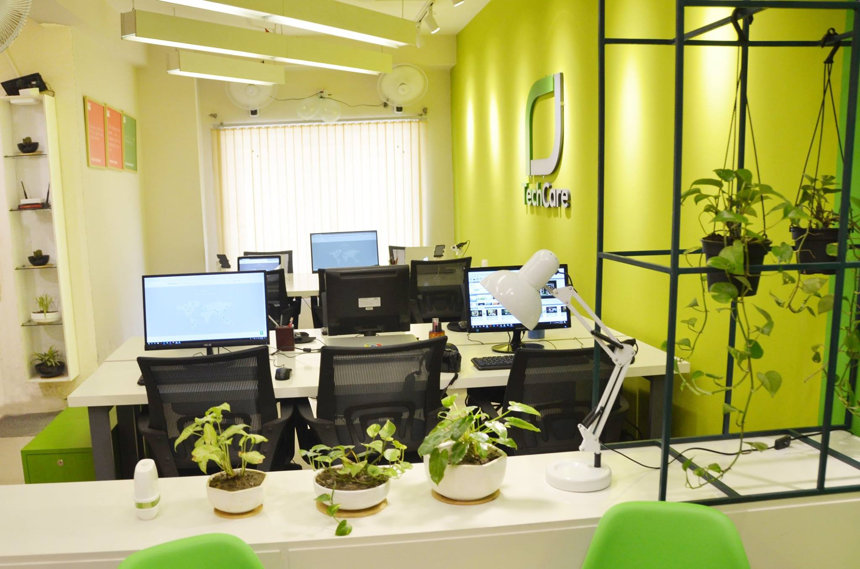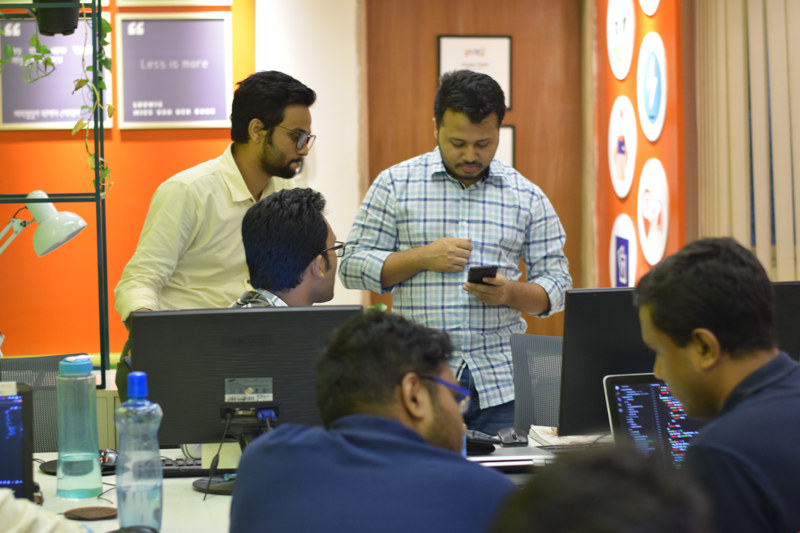
TechCare is a Bangladeshi origin and Edmonton, Canada-based UX and UI-focused Software Development Company. From a small bootstrapped project, started by two computer science undergrad students of Rajshahi University of Engineering and Technology (RUET), TechCare today employs over 17 people, serving hundreds of clients across markets. Using an innovative business model and quality service, the company has achieved consistent growth over the last few years.
In this wide-ranging interview with TechCare co-founder and COO Tofael Hossain, we dig into the making of TechCare to understand how the company has grown from a small bootstrapped software company to a prominent software development firm with a special concentration in UX and UI.
Mr. Hossain talks about his path to entrepreneurship, how TechCare came into being, the early days of building the company, gives us a peek into how his co-founder and he put together the team and initial resources and bootstrapped the company to where it is today, the evolution of TechCare over the past years, shares how TechCare has crafted an innovative subscription model in the software development space, the operational mechanics of the business, the state of TechCare today and its ambition going forward, reflects on the lessons he has learned from his journey so far and much more.
Future Startup: Thank you for agreeing to this interview. I wanted to start at the beginning of your journey, could you please tell us about your background and path to entrepreneurship?
Tofael Hossain: In 2014, I graduated from Rajshahi University of Engineering and Technology (RUET) with a B.Sc degree in CSE. This was my first time outside of Mymensingh, where I was born and raised. Solehin Islam, my business partner at TechCare, was my first RUET acquaintance. The relationship has evolved and changed both of our lives. Solehin and I have always had an entrepreneurial spirit. We have always wanted to do something unique.
Back in 2012, while we were in our 2nd year, it came to our attention that computer repair was challenging in Rajshahi. There were only a handful of stores in New Market run by Diploma engineers or those who learned by doing. It was challenging for computer owners to carry their computers to shops for repair.
By leveraging our knowledge of hardware and software, we decided to solve this pain point of customers and incorporated this service into a business model. In a nutshell, this is how TechCare came into existence. Room 121 of Zia Hall, RUET became our office. We began delivering on-demand computer repair services in people's homes with the help of our friends. We received a great response since consumers were getting professional engineers to help them with their computer issues.
Things were going well. The business was generating good revenue. We could see that the market offers an opportunity to build a large business. But we could also see that scaling the business would require a big investment. Because it was essentially a hardware firm, it proved extremely difficult to operate on a shoestring budget. As students, we knew we couldn't manage that kind of financing.
So, in 2013, we shifted our focus to software and registered TechCare as a software company. Solehin, my business partner, secured some projects for us with the help of his network. After working for a while, we realized that the success or failure of a tech product or service depends a lot on the user experience and how easily a user can embrace it. That is when we began our extensive research and moved our focus to UX and UI.
We were lucky to have some substantial projects around this time. We worked on several projects with the OnnoRokom Group around this time. We developed the mobile app for Prohori, a vehicle tracking system, as well as Rokomari's internal mobile app, which kept track of salespeople's calls.
We were stationed in Rajshahi until 2014. After our graduation, we relocated to Dhaka in 2015 and rented office space. We were handed a substantial project to design the platform for Onnorokom Pathshala. We received some overseas clients the same year.
There were plenty of software development companies in Bangladesh when we began TechCare, but none were focusing on user experience or UX. Design firms were also present, with a focus on graphics and web design. People were still unable to grasp the significance of user experience, thus they focused more on technology factors. We recognized this market gap and capitalized on it to the best of our ability. The UX-centric approach has had a significant impact on our clients' businesses, proving our hypothesis: user experience is the most conducive to business success.

Future Startup: What went into building the initial operation of TechCare? How did you put together initial investment and other things to get started? Please walk us through what the first few months of your journey were like.
Tofael Hossain: During our first and second years, we were doing tuition just like any other university student. Almost everyone had a PC at home and wanted to avoid the headache of repairs. We inquired if they wanted their repair services done at their home, and everyone responded in the affirmative.
We relied on word of mouth and published fliers at strategic locations throughout Rajshahi to market our service. This required a significant amount of manpower as well as logistics. We consulted several experienced members of our network, who recommended we seek funding once we had reached a particular level of maturity. Shohag bhai, the Chairman of Onnorokom Group, has been one of our biggest supporters and mentors.
We transitioned to the software side since it wasn’t as capital-intensive as the hardware business. We collaborated with our CSE department friends who were skilled at programming and software development. Most of these collaborations were project-based. The number of team members varied depending on the size of the project.
With the proceeds from our software business, we shifted to Dhaka in 2015 with an ambition to launch our hardware business here. We wanted to operate on a warehouse model similar to Chaldal, with our IT hubs strategically located around Dhaka. However, we experienced several challenges. The operations required significant funds and resources. We realized that it would be wise to postpone the on-demand technical service business and focus on our software business. So we continued working in the arena of software development.
As the number of projects grew, we decided to form a team. In 2015, we hired three new employees, which grew to four in 2016. We were still in our growth phase at the time, working on mid-level projects. Many times, we were unable to provide the desired levels of user experience. We learned as we went along.
Future Startup: Where does TechCare stand at the moment? How much has the company evolved over the past two years?
Tofael Hossain: We have been working in the UX-focused software development sector for the past 7 years. To date, we have worked on 600+ projects all around the world. Only 20% of our clientele are from Bangladesh, with the rest coming from all around the world.
With a 17 member team, we are currently providing services in the area of UX design of product or service, UI design, and software development. Our clients can accomplish all their designs and tech tasks by accessing TechCare’s pro web designers & developers for a monthly flat rate without the headache of hiring.
While most companies in the software development industry engage in body shopping or sub-contracting, we take full control of our resources and offer packages to our clients in the form of monthly and yearly subscriptions.
After a project is locked, there remains a lot of scopes to expand or retract its scope. With this in view, we decided to operate on a monthly subscription-based model which seems to be more appealing to our overseas clients.
We basically have two plans (i) $1100/month: best suited for website re-design, furnishing, and maintenance (ii) $7500/month: considered ideal for creating a new website or app design with ongoing expert advice. Both the plans include unlimited design tasks, unlimited technical tasks, unlimited changes, and world-class support.
Clients tell us about their difficulties, and we give solutions that bring value to their organizations.
We have a very standard process of work development. We divide each project into a set of defined tasks. At a given time, no more than one task remains active. A new task can only be convened after the completion of the preceding task. Every project is assigned a dedicated project manager and clients can track the progress of their respective projects through a dashboard.
We were initially reliant on referral systems to source projects and build our client base. We currently use cold calling, email marketing, and Google marketing for customer acquisition. We planned to do in-person office visits in Canada, but we were unable to do so because of the pandemic.
Future Startup: Can you kindly elaborate on how you manage your partners and clients?
Tofael Hossain: After a client signs up on our platform, we reach out to them. We jot down our client’s requirements from every angle. We typically prefer elaborate written documentation. Based on that, our team creates their own requirement specification document.
Next, we elaborately explain the process to our clients. We create a project wireframe which is the skeletal outline of a website or an app, design a clickable prototype, and decide on color palette and color design. After that, we send the product to our client for testing or we conduct internal testing. Based on the feedback, we iterate and ultimately develop the final version.
Every project is allocated a professional project manager, and clients can monitor the progress of their project via a dashboard.

Future Startup: What are some of the things that have worked for you?
Tofael Hossain: First of all, I must mention my partner Solehin. He first came up with the idea of TechCare. I have been with him all along. Over the years, our partnership has worked out wonderfully. We’ve always backed each other in the face of any challenges.
Secondly, we were frugal with our money. We prioritized savings and used the revenue to grow the business. We used our profits to improve the working environment. We made certain that our team was at ease and had access to all of the technical support and amenities needed for the job.
We have been lucky to have an excellent group of mentors who continue to support us. Our mentors have played an instrumental role in our growth. We are really grateful to our mentors who have guided us throughout the journey.
My business partner and I were always wary about hiring on the spur of the moment. In the early days, we used to do everything ourselves. We have always been conservative about hiring. Our team growth has always been deliberate and slow. It helped us to hire right and maintain a healthy business. It is critical to put together a staff that will not sink your startup. So we employ a stringent hiring procedure to ensure that the recruit is a good fit for the organization's culture.
In terms of consistent revenue generation, referrals really worked in our favor. This allowed us to take on projects both nationally and internationally while incurring no marketing costs.
Future Startup: How do you approach hiring and onboarding in your organization?
Tofael Hossain: In the event of direct hiring, we use a SaaS platform called Easy Jobs, which was created by a group of partners, including TechCare. We evaluate the candidates in a sequence of phases. After receiving the CVs, we conduct a preliminary screening based on experience and other criteria. The candidates are then asked to send us a video introducing themselves. This gives us a sense of their communication ability. In the final round, we invite them to an interview.
Our interview is designed very differently than usual job interviews. We don’t call them formal interviews, but rather discussions. We have a free-flowing conversation with the candidate and try to understand him/her better. We have found that open and free-flowing discussion leads to a better understanding of people than formal job interviews.
We try to assess their attitude and whether they are a suitable fit for our organization through discussion. People who have a natural aptitude for learning always have an advantage over other contenders. We also hire interns after their three-month internship period is completed. Because we get to directly observe the interns, this approach is relatively easier.
Our organization has a flat hierarchy. We attempt to individually engage with our employees and educate them about our company's objective and goal from the beginning. They are aware of who they are collaborating with and why. Our workplace culture is built on three pillars: mutual understanding, trust, and friendship.
Future Startup: What are the challenges that you’ve had to face along the course of your TechCare journey?
Tofael Hossain: In the early days, we didn't have much to put in our portfolio. We were recent graduates working full-time in our venture having no actual work experience. We were proficient and confident in our ability to manage tasks, but our lack of experience became a hurdle. Despite having the required skills, we would not get projects because of our lack of previous experience and portfolio. In those days, personal networks helped us to overcome some of those challenges.
We are currently dealing with larger clients with complex tech solutions that require more skillful resources. We do have skilled human resources in Bangladesh, but they frequently have to be micromanaged. They are hesitant to accept responsibility. We are having certain operational problems as the team grows. As a global company, we must maintain coherence throughout our hubs in various regions. So right now, finding the right people is a challenge for us.
My business partner has always been a "people person," but I am more of an introvert. I found it challenging to persuade my team members to work. Resource management was a little difficult for me. We realized the need for formal HR management when our team went above 10 employees. Solehin and I didn't have time to react to their emails about leave of absence and other matters.
Consequently, we began investigating the HR rules and developing our own procedures. I studied human psychology to better understand people by identifying their strengths and weaknesses. We would collaborate with our teammates if any challenges emerged. The biggest learning curve for me would be learning to deal better with people. Being an introvert, it was a challenge but I have eventually come to learn the basics of the trade.

Future Startup: What are the plans for TechCare now?
Tofael Hossain: We plan to build out our revenue model and pricing model further using the lessons we have learned over the years. Our ambition is to establish TechCare as a leading UX and UI-focused software development company in Canada in the short term and across markets in the future.
In Canada, we are looking to build a native team. We have been doing mostly remote communication in Canada. But we have seen that having a local team with local people makes a lot of difference in terms of developing the market and business.
Future Startup: What are some of the lessons you have learned over the course of your entrepreneurial endeavor?
Tofael Hossain: Patience is key. You may endure a lot of criticism, but it is critical that you respond positively to it. Patience is multidimensional. Patience when your people are not doing their best. Patience when customers are making unreasonable demands or complaining for no good reasons. Patience when things are not exactly going according to your expectation.
I struggled with this in the early days of my entrepreneurial journey. I would get upset on small matters and react. That did not serve me well. Instead, it would complicate apparently small matters and cause unnecessary tension. I have eventually learned to be patient with challenges and difficulties. It has been transformative for me.
